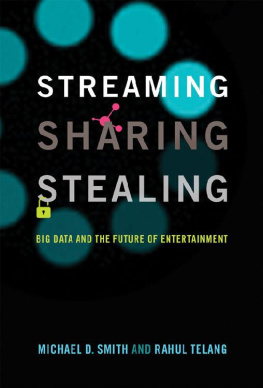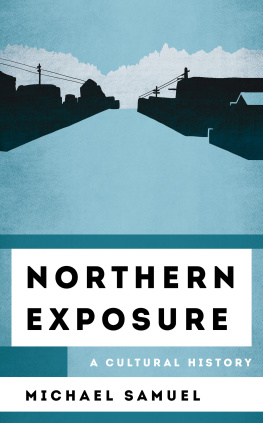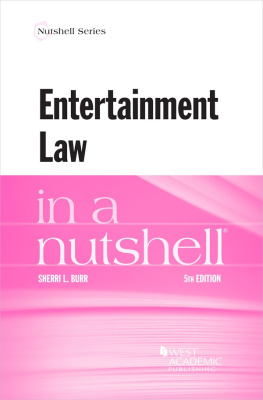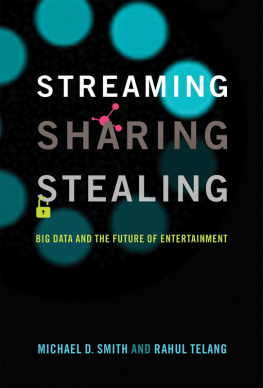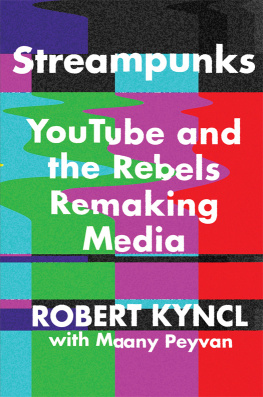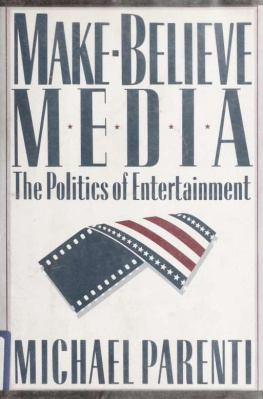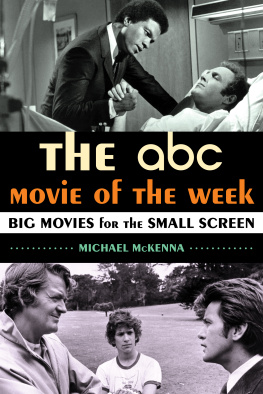Streaming, Sharing, Stealing
Big Data and the Future of Entertainment
Michael D. Smith and Rahul Telang
The MIT Press
Cambridge, Massachusetts
London, England
2016 Massachusetts Institute of Technology
All rights reserved. No part of this book may be reproduced in any form by any electronic or mechanical means (including photocopying, recording, or information storage and retrieval) without permission in writing from the publisher.
Good Times Bad Times
Words and music by Jimmy Page, John Paul Jones, and John Bonham. Copyright 1969 (renewed) Flames of Albion Music, Inc. All rights administered by WB Music Corp. Exclusive print rights for the world excluding Europe administered by Alfred Music. All rights reserved. Used by permission of Alfred Music.
Changes
Written by David Bowie. Reprinted by permission of Tintoretto Music, administered by RZO Music, Inc.
Set in Stone Sans and Stone Serif by Toppan Best-set Premedia Limited. Printed and bound in the United States of America.
Library of Congress Cataloging-in-Publication Data
Names: Smith, Michael D., 1968- author. | Telang, Rahul, author.
Title: Streaming, sharing, stealing : big data and the future of entertainment / Michael D. Smith and Rahul Telang.
Description: Cambridge, MA : MIT Press, 2016. | Includes bibliographical references and index.
Identifiers: LCCN 2015045807 | ISBN 9780262034791 (hardcover : alk. paper)
eISBN 9780262335874
Subjects: LCSH: Streaming technology (Telecommunications) | Data transmission systems. | Big data. | Motion pictures.
Classification: LCC TK105.386 .S65 2016 | DDC 384.3/8dc23 LC record available at https://lccn.loc.gov/2015045807
10987654321
To Rhonda Smith, my best friend and the love of my life. Michael
To my wife Ashwini and my boys Shomik and Shivum. They fill my life with so much joy. Rahul
Table of Contents
List of Tables
List of Illustrations
Guide
Acknowledgments
This book sits at the interface between two of our shared passions. First, we have a passion for great entertainment and a desire to see the motion picture, music, and publishing industries continue to be able to deliver great stories and invest in great storytellers. Second, we have a passion for using data and statistical analysis to understand how consumers and markets behave. We have many people to thank for helping us pursue both of these interests in our research and in this book.
We are indebted to our colleagues at the Heinz College at Carnegie Mellon University for allowing us to be part of a great community of scholars. In particular, we thank Dean Ramayya Krishnan for supporting our vision of a research center for entertainment analytics, and Vibhanshu Abhishek, Peter Boatwright, Brett Danaher, Pedro Ferreira, Beibei Li, and Alan Montgomery for being vital participants in that research. We also thank the many doctoral students we have had the pleasure of working with at Carnegie Mellon, including Uttara Ananthakrishnan, Daegon Cho, Samita Dhanasobhon, Anindya Ghose, Jing Gong, Anuj Kumar, Liron Sivan, and Liye Ma. Members of the staff at Carnegie Mellon have created a wonderful environment within which we can teach and do research, and we thank Andy Wasser and Sean Beggs in the Masters of Information Systems Management program, Brenda Peyser in the Masters of Public Policy and Management program, and John Tarnoff and Dan Green in the Masters of Entertainment Industry Management program for their hard work in each of these academic programs. Mary Beth Shaw in Carnegie Mellons General Counsel Office has been an outstanding advocate for our research, and we are grateful for her help. Our colleague Millie Myers provided us with outstanding insight into external communication through her media training program. We also thank the many students we have had a chance to interact with during our time at Carnegie Mellon. In particular, we thank Chris Pope, Ricardo Guizado, and Jose Eduardo Oros Chavarria for their outstanding data analytics support.
We are thankful to the many people in the entertainment industry who have shared their expertise and experiences with us. Among others, we would like to thank Cary Sherman and his team at the Recording Industry Association of America for excellent guidance and insight into the music industry, and Al Greco and his team at the Book Industry Study Group for data and expertise pertaining to the publishing industry. We would also like to thank the Motion Picture Association of America for its continued, stalwart support of our research at Carnegie Mellon University through Carnegie Mellons Initiative for Digital Entertainment Analytics.
We are indebted to several people for support and encouragement. Andrew McAfee encouraged us to pursue our vision and introduced us to his outstanding literary agent, Rafe Sagalyn. Rafe has provided invaluable help in crafting our vision and guiding our book in the marketplace. Jane MacDonald and her team at the MIT Press have been a delight to work with, and we are very thankful to them for taking a chance on two first-time authors. We also thank Natalie Madaj and David Israelite at the National Music Publishers Association for their help in securing copyright permissions. Finally, and most importantly, we would have never finished this book without the guidance, help, patience, and good humor of our editor, Toby Lester. Toby has the uncanny skill and ability to take our random thoughts and ideas and to turn them into exactly what we wanted to say. Without him we would still be re-wording chapter 2.
Personal Acknowledgments
I would like to thank Erik Brynjolfsson for being my advisor, coach, and mentor at MIT. I couldnt have asked for a better example of what it means to be a scholar. None of this would have been possible without the love and support of my dear wife. Rhonda, thank you for believing in me and for encouraging me to try so many things I didnt think I could do. Thank you Davis, Cole, and Molly, for the joy youve brought into our lives. Mom and Dad, thank you for your patience and for giving me a love of learning. And thank you to Jesus Christ for cancelling a debt I owe with a sacrifice I can never repay. M.D.S.
I would like to thank my mother and father, who always believed in me and let me chase my dreams. My wife Ashwini, who is a constant source of inspiration and makes me try harder. My boys Shomik and Shivum constantly encourage me without saying a word because they believe in me more than anyone else. Finally, I am thankful to all my mentors, colleagues, and students, who teach me something new every day. R.T.
I Good Times, Bad Times
In the days of my youth I was told what it means to be a man / Now Ive reached that age, Ive tried to do all those things the best I can / No matter how I try I find my way into the same old jam
Led Zeppelin, Good Times, Bad Times
House of Cards
Every kitten grows up to be a cat. They seem so harmless at firstsmall, quiet, lapping up their saucer of milk. But once their claws get long enough, they draw blood, sometimes from the hand that feeds them.
Frank Underwood, in the Netflix original series House of Cards
For the creative industriesmusic, film, and publishingthese are the best of times and the worst of times. New technologies have provided self-published authors, independent musicians, and other previously disenfranchised creators with powerful new ways of doing their work and reaching their audiences, and have provided consumers with a wealth of new entertainment options. Together these changes have produced a new golden age of creativity. But the same technologies also have changed the competitive landscape, weakened the control that established players can exert over both content and consumers, and forced business leaders to make difficult tradeoffs between old business models and new business opportunities. In the face of these changes, many powerful firms have stumbled and lost ground in markets they used to dominate.

